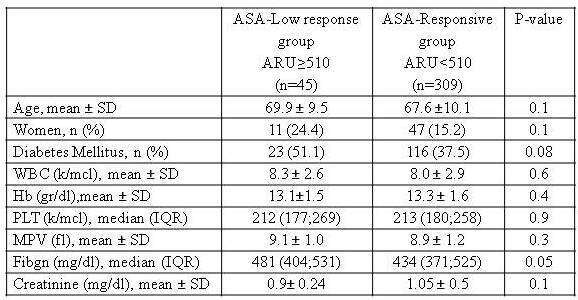In recent years low response to the anti-platelet effects of aspirin (ASA) has been reported in five to ten percent of patients and is associated with adverse outcomes.
In contrast to the low-response to clopidogrel, the mechanism involved in the low-response to ASA is unclear. We hypothesized that an active inflammatory process is associated with the low response . We thus aimed to examine whether low response to ASA is correlated with inflammatory markers.
Methods: We evaluated 354 consecutive patients with stable coronary artery disease, treated with ASA 75mg to 100mg per day. Response was evaluated with VerifyNow ASA assay (Accumetrics Inc, San-Diego, Calif). Inflammation was evaluated by white blood cell count (WBC), platelet count (PLT), mean platelet volume (MPV), blood fibrinogen concentration (Fibgn). Cutoff of ≥510 aspirin reaction units (ARU) was used to define low response to ASA.
Results: A total of 43 patients (12% ) had ARU≥510.

* IQR-Interquantile Range (25th ; 75th percentiles)
As shown in the table, patients with diabetes tended to have low response to aspirin, fibrinogen levels were higher among patients with low response to ASA.
Conclusion: The study suggests that low response to ASA may be associated with increased inflammatory reaction.

